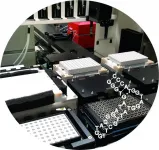Incurable cancer: Patients need palliative care support early on
Anxiety and depression frequent side effects, new study reveals
2021-03-26
(Press-News.org) So far, there has been little research into supportive care needs in patients with newly diagnosed incurable cancer and as their disease progresses. That is why experts from the German Cancer Society's working group on palliative medicine, led by Professor Florian Lordick, Director of the University Cancer Center Leipzig (UCCL), surveyed 500 patients between the ages of 25 and 89. What made the project special was the fact that the patients were accompanied from the moment they were diagnosed and before receiving any treatment. Professor Lordick sums it up thus: "There is an urgent need for patients to have early access to supportive palliative care for a wide range of issues, including psychosocial support." Palliative care is not about healing, but about maintaining quality of life, relieving pain, treating other physical ailments and problems of a psychosocial and spiritual nature.
Two-thirds of patients diagnosed with incurable cancer reported immediate, significant physical and emotional distress. The study paints a complex picture of the care provided by 20 cancer treatment centres across Germany, from university to community settings, from outpatient to inpatient care. Oncologist Lordick explains: "The patients were very interested in the survey, despite the fact that they were in a very difficult situation and the study required them to reveal their inner selves to a certain degree. That showed us just how important this issue is to them."
Patients were surveyed shortly after being diagnosed with incurable lung (217), gastrointestinal (156), head and neck (55), gynaecological (57) and skin (15) cancers, and again after three, six and twelve months. The focus was on patients' distress, symptom burden, quality of life and supportive care needs.
More than 30 per cent of respondents reported anxiety and depression shortly after diagnosis. Complaints of a lack of energy, nutritional and digestive problems, and pain were also very common. The study shows where the needs of those affected are particularly high. When comparing patients with different cancers, those with stomach, oesophageal, liver, or head and neck tumours displayed the highest level of distress over the entire observation period.
Professor Lordick believes the study results can be used to draw clear conclusions for medical practice, explaining: "Cancer centres need to have expert palliative care services, both on an inpatient and outpatient basis. These include specialised nutritional counselling, pain management, and physiotherapy and psychosocial support." The expert from Leipzig University Hospital concludes that the results underline the necessity of introducing comprehensive symptom screening and early palliative medical care.
INFORMATION:
ELSE PRESS RELEASES FROM THIS DATE:
2021-03-26
Usually, the different areas in the cerebrum take on a very specific function. For example, they process our movements or things we see or hear, i.e. direct physical information. However, some areas of the brain come into play when dealing with more advanced mental tasks. They process incoming information that has already been pre-processed and is thus already at an abstract level.
It was already known that the inferior parietal lobe (IPL) is one of these regions in the human brain. Nevertheless, it was unclear how this area is able to process such very different functions. In a large study, scientists from the Max Planck Institute for Human Cognitive and Brain Sciences (MPI CBS) in Leipzig and McGill ...
2021-03-26
During a normal waking state, information is processed and shared by various parts within our brain to enable flexible responses to external stimuli. Researchers from the University of Turku, Finland, found that during hypnosis the brain shifted to a state where individual brain regions acted more independently of each other.
"In a normal waking state, different brain regions share information with each other, but during hypnosis this process is kind of fractured and the various brain regions are no longer similarly synchronised," describes researcher Henry Railo from the Department of Clinical Neurophysiology at the University of Turku.
The finding shows that the brain may function quite differently ...
2021-03-26
Scientists at the University of Bonn and the caesar research center have isolated a molecule that might open new avenues in the fight against SARS coronavirus 2. The active ingredient binds to the spike protein that the virus uses to dock to the cells it infects. This prevents them from entering the respective cell, at least in the case of model viruses. It appears to do this by using a different mechanism than previously known inhibitors. The researchers therefore suspect that it may also help against viral mutations. The study will be published ...
2021-03-26
Researchers have demonstrated that stretching shape-memory polymers embedded with clusters of gold nanoparticles alters their plasmon-coupling, giving rise to desirable optical properties. One potential application for the material is a sensor that relies on optical properties to track an object or environment's thermal history.
At issue is a stretchable polymer embedded with gold nanospheres. If the material is heated and stretched, followed by cooling to room temperature, the material will hold its stretched shape indefinitely. Once reheated to 120 degrees Celsius, the material returns to its original shape.
But what's really interesting is that the gold nanospheres are not perfectly dispersed in the polymer. ...
2021-03-26
A recent study published in JCI found that a neutrophil's endoplasmic reticulum, the organelle that normally makes proteins in the cell, becomes stressed in the autoimmune disorder lupus. This stress activates a molecule called IRE1α, which appears to play a critical role in lupus pathogenesis in mice.
A multidisciplinary research group at the University of Michigan, spanning microbiology, dermatology and rheumatology, discovered that IRE1α orchestrates the release of neutrophil extracellular traps, or NETs, from lupus neutrophils. NETs are sticky, spider web-like structures that cause inflammation when released at the wrong time or in the ...
2021-03-26
Research has found that obesity and mental disorders such as depression and anxiety seem to often go hand in hand. Researchers at Baylor College of Medicine and collaborating institutions are providing new insights into this association by identifying and characterizing a novel neural circuit that mediates the reciprocal control of feeding and psychological states in mouse models.
Similar to human patients, mice that consumed a high-fat diet not only became obese, but also anxious and depressed, a condition mediated by a defective brain circuit. When the researchers genetically ...
2021-03-26
Reactive oxygen species (ROS) cause oxidative stress at the cellular level. Research shows that this way, amongst others, they inhibit the germination capacity of plants, produce cytotoxins or exert toxic effects on aquatic invertebrates. Environmentally persistent free radicals (EPFR) are potential precursors of ROS because they can react with water to form these radical species. "Therefore, EPFR are associated with harmful effects on the ecosystem and human health," explains Gabriel Sigmund, the lead investigator of the study.
"Our study shows that these environmentally persistent free radicals ...
2021-03-26
Colorectal cancer risk does not rise after bariatric surgery, a study from the University of Gothenburg shows. This finding is important for patients with obesity, and their healthcare professionals, when deciding upon such an operation.
Obesity is a known risk factor for several types of cancer, including colorectal cancer (affecting the colon or rectum). It is already established that bariatric surgery leads to a decrease in overall cancer risk in patients with obesity.
However, some studies on colorectal cancer have shown an elevated cancer risk after bariatric surgery, while others have reported a risk reduction. ...
2021-03-26
The immune systems of all vertebrates contain specialized cells, called T cells, that play a fundamental role in protecting against fungal, bacterial, parasitic and viral infections. T cells use 'molecular sensors' called T cell receptors (TCRs) on their surface that can detect and eliminate the invading pathogens. For most of the past four decades, it was considered that there were only two T cell lineages, αβ and γδ T cells, characterized by their cell surface expressed αβ and γδ TCRs, respectively.
In a paper published today in Science, an international team of scientists at the University of New Mexico (US), Monash University (Australia), and the US National Institutes of Health, has defined a novel T cell lineage, called γμ ...
2021-03-26
Renewable energy demand and consumption is at an all-time high in the United States.
Shrub willow - a quick-growing woody crop - can be an excellent source of renewable bioenergy. The crop is harvested and turned into wood chips, which can be used for heat, mulch, animal bedding, biochar, and biofuel.
In a new study, researchers grew shrub willow on a semi-commercial scale to better understand the nuances of this bioenergy crop. The research was published in Agronomy Journal, a publication of the American Society of Agronomy.
"We learned and developed key know-hows that we can transfer to industry partners interested in this crop," says Armen Kemanian. Kemanian is a member of the American Society of Agronomy and is the ...
LAST 30 PRESS RELEASES:
[Press-News.org] Incurable cancer: Patients need palliative care support early on
Anxiety and depression frequent side effects, new study reveals




